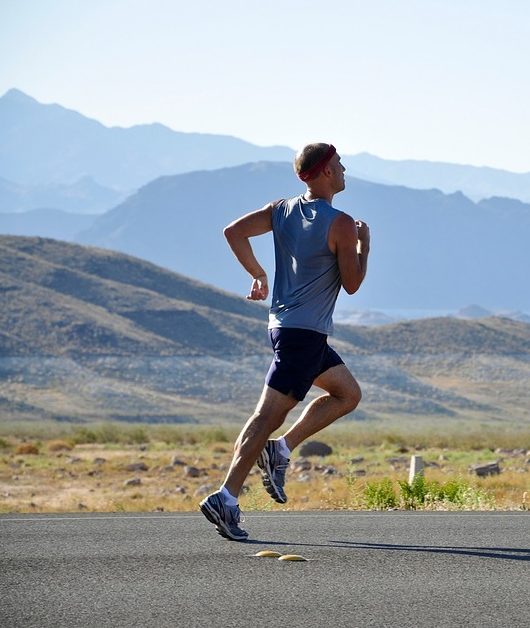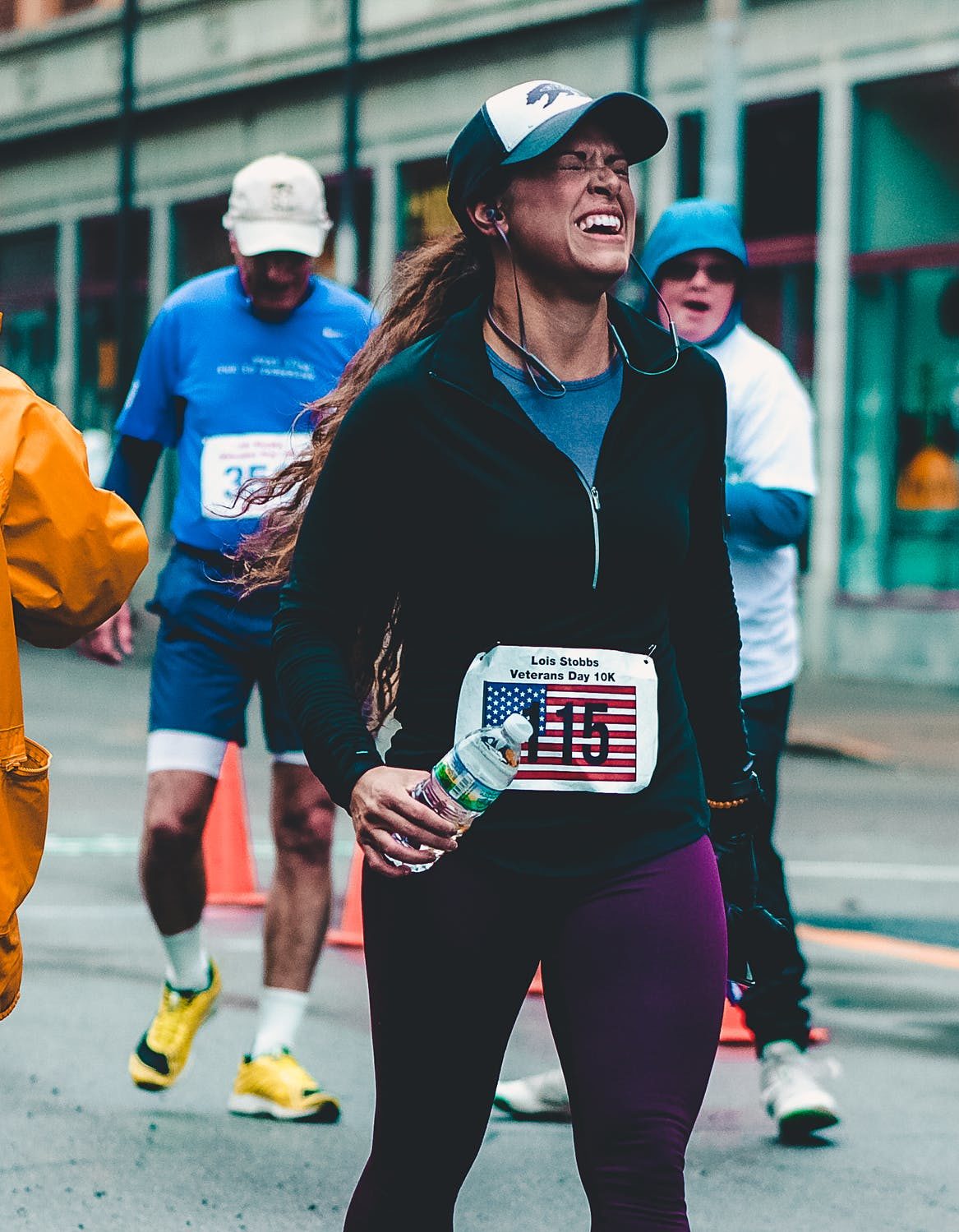Marathon training
by Scott Dutfield · 23/01/2019

With the London Marathon not too far away, we asked the experts to explain the science behind surviving the gruelling 26.2-mile race
Why don’t you run the full marathon distance in training?
You’d expect it would be a good idea to run the full distance ahead of the big day at least once, but that isn’t actually the case. Dr Andy Blannin, lecturer in exercise metabolism at the University of Birmingham, explains. “You can get the training adaptations needed by running a variety of distances; typically the longest run will be 16–20 miles [25.7–32.2 kilometres]. These distances are sufficient to stress the energy stores, particularly glycogen, a natural carbohydrate polymer, in the muscles and liver. Going longer than this, or attempting 26 miles [41.8 kilometres], in training can induce unnecessary fatigue, both physical and mental.” So running a full marathon would essentially exhaust your body and deplete your energy stores. If you can run 20 miles [32.2 kilometres] comfortably, that should set you up nicely for the race.

Why do short runs
Most marathon runners will have days when they only run a few miles, even if they’re capable of much longer distances. The benefit of this is to prevent lactic acid build up on race day. Nairn Scobie, lecturer in sports science at the University of Glasgow, explains the science behind this method. “Shorter runs, especially if they are performed at a higher intensity, can help improve your lactate threshold. Lactate threshold is the point at which lactate begins to accumulate in the muscle. Once it begins to build up the athlete will soon fatigue. By training at high intensity for short periods of time at an intensity above the athlete’s lactate threshold, over time they will delay the point at which the lactate threshold occurs.” Delaying the onset of lactic acid build up will really help you in the latter stages of a marathon when your muscles are tiring.

What causes muscle cramps?
Lactic acid is the enemy of the short-distance runner, but it can also affect marathon runners. It’s the cause of cramp and can be incredibly painful, as Nairn Scobie explains. “Lactate builds up at the end of a process called glycolysis, which breaks down carbohydrates into pyruvate. In conditions where plenty of oxygen is available, this pyruvate enters a process that creates lots of energy. In conditions with little oxygen available (anaerobic respiration) this pyruvate is converted into lactate. In high-intensity exercise there is an increased release of lactate. Exercise at this level can only be tolerated for a short period.” So if you’re pushing hard in a race and feel fatigued, slow down and breathe deeply to re-oxygenate your blood.

Is it better to train in the morning or the evening?
Dr Stephen Mears, lecturer in sport and exercise nutrition at Loughborough University, says you can get more out of different types of training at different times. “Studies in the lab in normal conditions have shown no difference unless the exercise is in the heat, and then performance increases in the morning, possibly due to a lower starting core temperature. If you want to train in a fasted state and try to utilise fat stores during a run it is easier to run before breakfast. If you want to perform well at a high intensity, fuel is needed and this means training later in the morning or early on in the evening.”

What is carb loading?
When you digest carbohydrates, the sugars inside them are stored as glycogen in the muscles and liver, providing a quick-release source of energy. Before a race, runners will load themselves up with foods rich in carbohydrates to help them ‘stock up’ their glycogen stores. Duane Mellor, senior lecturer in human nutrition at Coventry University, explains why. “There are two types of carb loading: one where you taper your carbs to run them down and do the same with training and then eat carbohydrate to reload, while the other is just increasing carbohydrates to eight to ten grams per kilogram [of body weight].” Filling your body with carbs the night before a race should provide you with enough glycogen fuel to sustain you for the majority of the race. Just make sure you don’t eat too late, as a carb-rich meal can weigh heavily on your stomach.

What happens when a runner ‘hits the wall’?
‘Hitting the wall’ is a term used by runners to explain the moment they suddenly become physically and mentally fatigued while running long distances. Dr Blannin reveals why this happens. “This phenomenon is multi-faceted, but one of the major factors is likely to be the severe depletion of the body’s glycogen stores. Without glycogen in the muscle and no glucose coming from the glycogen stores in the liver, the muscle has limited metabolic pathways to produce energy for running.” The sensation of hitting the wall occurs when your body changes its major energy source from glycogen to fat. Burning fat is a more complicated (slower) metabolic process, but effective training helps prepare the body to use its fat stores more efficiently.

Why do we need to drink water during a race?
We drink water to rehydrate our bodies, something especially important during a run, as Dr Mears explains. “When you exercise, you sweat. This is to dissipate heat through evaporation. When you lose fluid, blood volume decreases meaning your heart must work harder to pump the blood around the body and maintain cardiac output. Drinking fluid allows you to replace the fluid that has been lost and maintain blood volume. This will allow you to continue to sweat and will also allow blood to be directed to the skin to allow further heat loss. It is recommended not to lose more than two per cent of your body weight through sweat.” Losing more than this can lead to dehydration, affecting your physical and mental performance.

Does listening to music help during a race?
Many runners listen to music while running. Rather than just force of habit, Nairn Scobie suggests there could be psychological benefits in jogging to your favourite tunes. “We could feel motivated by certain songs or types of music. Listening to music during exercise can also help us dissociate from the activity. To put it simply, if we pay attention to the music then it can help us forget about the pain we may experience during the run.” So if you’re struggling to motivate yourself, your favourite music could distract you enough to get in those crucial miles.

This article was originally published in How It Works issue 111, written by Jamie Frier
For more science and technology articles, pick up the latest copy of How It Works from all good retailers or from our website now. If you have a tablet or smartphone, you can also download the digital version onto your iOS or Android device. To make sure you never miss an issue of How It Works magazine, subscribe today!





